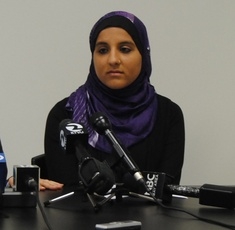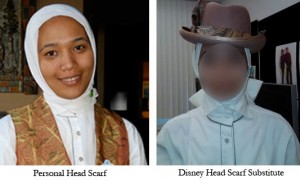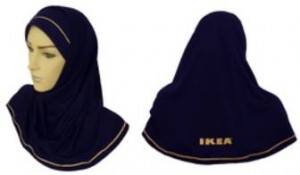
A couple of years ago, Hani Khan worked at a Hollister clothing store at San Mateo's Hillsdale Shopping Center. When she was hired, Khan agreed to wear only white, navy, or gray headscarves, or hijabs, in order to fit the company colors of Holliser, an Abercrombie & Fitch subsidiary. But four months into her employment, Khan says, a human resource official from the company told that her head scarf violated the store's "look policy."
"I was completely shocked," Khan said. "Nothing like this has ever happened to me. I was 19 at the time and no one had ever had an issue with my hijab."
Khan refused to comply and was suspended and then fired in February. (Video interview with Khan here.) The EEOC ruled that Khan was fired illegally and filed suit (.pdf here), in conjunction with the Legal Aid Society of San Francisco and the Council on American-Islamic Relations, which are representing Khan.
U.S. law forces employers to make accommodations for religious beliefs, unless it would be an "undue hardship" in conducting business.
Unless it would be an undue hardship on the employer's operation of its business, an employer must reasonably accommodate an employee's religious beliefs or practices. This applies not only to schedule changes or leave for religious observances, but also to such things as dress or grooming practices that an employee has for religious reasons. These might include, for example, wearing particular head coverings or other religious dress (such as a Jewish yarmulke or a Muslim headscarf), or wearing certain hairstyles or facial hair (such as Rastafarian dreadlocks or Sikh uncut hair and beard). It also includes an employee's observance of a religious prohibition against wearing certain garments (such as pants or miniskirts).
When an employee or applicant needs a dress or grooming accommodation for religious reasons, he should notify the employer that he needs such an accommodation for religious reasons. If the employer reasonably needs more information, the employer and the employee should engage in an interactive process to discuss the request. If it would not pose an undue hardship, the employer must grant the accommodation.
Khan is now one of three women suing Abercrombie & Fitch for either not hiring, or firing, women wearing headscarves. Samantha Elauf, a 19-year-old community college student from Tulsa, Oklahoma, filed suit in 2009, and an unnamed 18-year-old woman from Milpitas filed suit in 2010.

At issue is whether a violation of the "look policy" would cause the company undue hardship. Businesses have rarely been able to prove that complying with a request would cause undue hardship.
